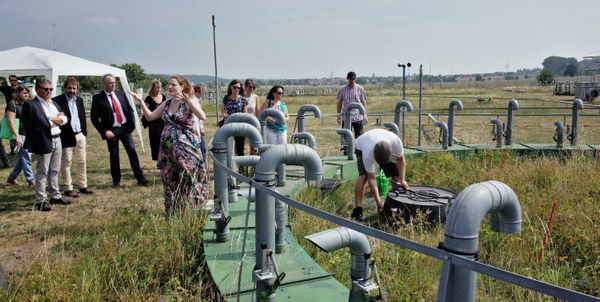Interdisciplinary research on sustainable use of natural resources
Only sustainable use of natural resources will ensure sufficient, healthy food and an environment fit for human beings. We are dependent on biological systems whose complexity is not yet sufficiently known, let alone controllable. iFZ research is working to identify risks to our environmental systems and to find ways to use limited resources more efficiently.
- Climate impact research in a unique field experiment
Climate impact research is the core topic of the "Free AirCarbon Dioxide Enrichment" (FACE) plant ecology facility at the Environmental Monitoring and Climate Impact Research Station in Linden, which has been running continuously since 1998. The facility was developed in close cooperation with the Hessian State Agency for Nature Conservation, Environment and Geology (HLNUG) and is one of the longest running facilities of its kind in the world. The close cooperation with the HLNUG ensures the continuity of the research infrastructure, the direct transfer of knowledge to the environmental authorities and enables broad-based public relations work. Thus, the experimental station became a visitor magnet in the heat summer of 2019.

FACE anniversary event at the Environmental Observation and Climate Impact Research Station in Linden (Photo: Weber)
- Sustainable food systems and biodiversity in international networks
iFZ members are currently coordinating a number of international research networks focusing on sustainable food systems and biodiversity.
The EU Horizon projects "HealthyDiets4Africa" and "UPSCALE: Upscaling the benefits of push-pull technology for sustainable agricultural intensification in East Africa" are two examples of the iFZ's wide-ranging inter- and transdisciplinary cooperation in the field of sustainable food and agriculture and agroecology in Europe and Africa.
Irrigation with wastewater enables more efficient water use in times of increasingly scarce water resources. The DFG research group FOR 5095 "Interactions of pollutants, antibiotic resistance and pathogens in a changing wastewater irrigation system" examines the environmental and health risks of the transition from irrigation with untreated wastewater to irrigation with treated water in order to enable safe wastewater use to increase food production in a sustainable circular economy.
In the international research training group IRTG 2843 "Advancing Crop Genetic Gain" in cooperation with the University of Queensland in Australia, working groups from the Professorships of Plant Breeding, Biometry and Population Genetics, Agribioinformatics and Genetics of Crop Diversity are focusing on the training of doctoral students in modern plant breeding and on the development of methods for the rapid adaptation of crops to the challenges of climate change.
- Innovative research field of insect biotechnology
In the innovative research field of insect biotechnology developed out of the iFZ, biotechnological methods are researched and applied to make insects or molecules, cells, organs and associated microorganisms derived from them usable as products or services. With this consistently translational research approach, the Bioresources Division of the Fraunhofer Institute for Molecular Biology and Applied Ecology (IME) was established in Giessen. The Fraunhofer Project Group Bioresources served as the nucleus in 2009, then the LOEWE focus Insect Biotechnology was acquired and, after successful evaluation, expanded to become the LOEWE Center for Insect Biotechnology and Bioresources (LOEWE-ZIB). The objectives of the LOEWE-ZIB included the establishment of close cooperation in translational life sciences between the JLU and the Technische Hochschule Mittelhessen (THM) as well as the establishment of the master's degree program Insect Biotechnology and Bioresources, for which two professorships were also created at the iFZ. The director of the Institute of Insect Biotechnology is also project leader in the LOEWE Center for Translational Biodiversity Genomics under the auspices of the Senckenberg Society (SGN). Within the framework of this research network, two further professorships funded by the SGN have been established at the iFZ.
- iFZ research infrastructure
The further development of the iFZ research infrastructure plays a key role in determining which resources will be available for research in the future. The renewal of the iFZ infrastructure has long since begun 25 years after it was moved into. The guiding principle for this transformation is the overall concept of sustainable university development
